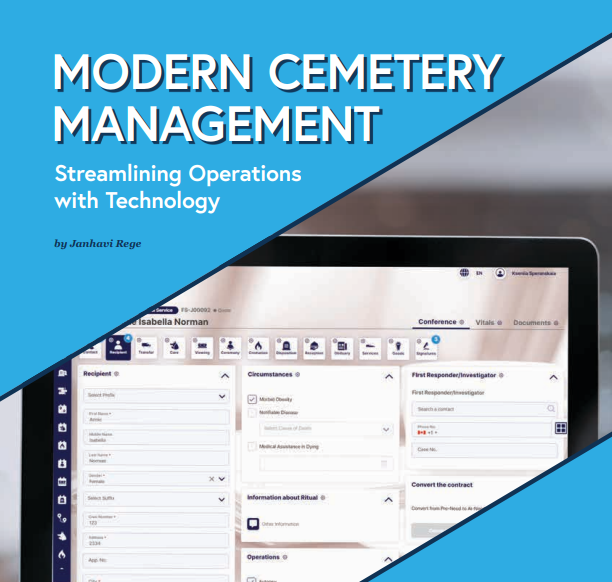(404) 312-6640
MODERN CEMETERY MANAGEMENT: Streamlining Operations with Technology
In the 21st century, technology has permeated nearly every aspect of our lives, from how we communicate to how we manage businesses. The cemetery industry, often perceived as traditional and resistant to change, is no exception. Technological advancements are now transforming cemetery management, streamlining operations, and improving both efficiency and service quality. This article explores how these innovations are reshaping the landscape of modern cemetery management.
DIGITAL MAPPING AND RECORD-KEEPING
One of the most significant technological advancements in cemetery management is the digitization of mapping and record-keeping. Traditional methods involved paper maps and records, which were not only cumbersome to manage but were also prone to errors and loss. Digital mapping systems now allow cemeteries to create precise, interactive maps of their grounds. These systems often integrate GPS technology, making it easier to locate specific gravesites accurately. Digital records enhance the accuracy and accessibility of burial records. Cemetery staff can quickly retrieve information about plots, including ownership details, burial dates, and maintenance schedules.
Funeral 365 offers advanced record-keeping solutions that provide cemeteries with detailed, interactive maps. The system also allows for the easy retrieval and management of digital records, significantly reducing the risk of errors and improving operational efficiency. With Funeral 365, cemetery managers can maintain a comprehensive digital archive that simplifies the management of records and enhances the overall operational workflow. Funeral 365 has plans to integrate GPS functionality into its system in the future to ensure accurate location tracking of plots.
MANAGEMENT SOFTWARE
Cemetery management software has become an essential tool for modern cemeteries. These comprehensive platforms offer a range of functionalities, from plot management and sales tracking to customer relationship management (CRM) and financial reporting. By consolidating these functions into a single system, cemetery operators can streamline their workflows and reduce the time spent on administrative tasks.
For example, Funeral 365 provides tools to manage inventory, schedule services, and handle billing and invoicing. Such software solutions help in automating repetitive tasks, ensuring that cemetery operations run smoothly and efficiently. The integration of these various functions into a unified system eliminates the need for multiple disparate tools, reducing complexity and enhancing productivity. Additionally, these systems often come with customizable features that cater to the unique needs of each cemetery, further optimizing their operations.
ONLINE SERVICES
The internet has revolutionized how people access information and services, and cemeteries are leveraging this shift to enhance the customer experience. Many cemeteries now offer online services that allow families to search for gravesites, purchase plots, and even plan services from the comfort of their homes. These online platforms provide a level of convenience that was previously unimaginable, helping families navigate the often-stressful process of planning a burial.
Funeral 365’s online platform enables cemeteries to display available gravesites and manage plot availability. This convenience helps the cemetery to attract clients who may live far away and simplify the planning process during a difficult time. By offering a user-friendly interface and comprehensive online tools, cemeteries can provide better service to families and ensure that their needs are met with minimal hassle. This shift to digital also allows for easier communication and follow-up, ensuring that families feel supported throughout the process.
MAINTENANCE AND GROUNDSKEEPING
Technology is also transforming how cemeteries maintain their grounds. Automated irrigation systems, for instance, ensure that the landscaping remains lush and well-kept with minimal human intervention. These systems can be programmed to water specific areas at optimal times, conserving water and reducing labor costs. By using sensors and smart technology, these irrigation systems can adjust watering schedules based on weather conditions, further enhancing their efficiency and sustainability.
Drones are another innovative tool being used in cemetery maintenance. They can efficiently survey large areas, providing aerial imagery that helps in planning landscaping projects and monitoring the condition of the grounds. Drones can also be used to create up-to-date maps, ensuring that digital records remain accurate. The use of drones reduces the time and effort required for manual inspections and allows for quicker identification and resolution of any issues.
Funeral 365 integrates maintenance scheduling and task management into its software. This feature helps cemetery staff plan and execute groundskeeping tasks efficiently. By tracking maintenance activities and using automated reminders, cemeteries can ensure their grounds remain in excellent condition. The system also allows for better resource allocation, ensuring that staff time and effort are used where they are most needed.
DATA SECURITY
In an increasingly digital world, data security is paramount for cemeteries managing sensitive information. Modern security technologies, including encryption and secure access controls, help protect these vital records. Advanced encryption ensures that all data, from burial records to financial transactions, is securely stored and transmitted, safeguarding it from unauthorized access.
Some cemeteries are even exploring the use of biometric authentication to enhance data security. This advanced technology can verify authorized personnel, preventing unauthorized access and ensuring that sensitive information remains protected. The integration of these data security measures ensures that cemeteries maintain the highest standards of data integrity and privacy.
The data security of Funeral 365 is backed by Microsoft’s robust data security and privacy procedures. Microsoft continually enhances its security practices to adapt to evolving threats, investing millions of dollars each year to implement measures that safeguard customer data.
Customers retain control over their data, knowing precisely where it’s located and how it’s used. Microsoft ensures that data is securely encrypted both when stored (at rest) and during transmission (in transit). They actively protect data from unauthorized access by third parties. Can your current system offer the same level of security?
ENVIRONMENTAL SUSTAINABILITY
With growing awareness of environmental issues, cemeteries are also adopting sustainable practices. Technology plays a crucial role in this shift. For instance, natural or green burials, which minimize environmental impact, are becoming more popular. Cemeteries can use software to manage these special plots and ensure compliance with environmental regulations.
Moreover, energy-efficient lighting, solar panels, and electric maintenance vehicles are being integrated into cemetery operations to reduce carbon footprints. These technologies not only promote sustainability but also reduce long-term operational costs. By investing in sustainable practices, cemeteries can demonstrate their commitment to environmental stewardship and attract eco-conscious clients.
Funeral 365, being a paperless solution, supports sustainable practices by offering features tailored for managing green burials. The software tracks eco-friendly plots and ensures compliance with environmental standards, helping cemeteries adopt more sustainable practices. This focus on sustainability not only benefits the environment but also enhances the reputation of the cemetery.
CONCLUSION
The integration of technology into cemetery management is transforming an industry that has traditionally been slow to change. From digital mapping and management software to online services and advanced security measures, technological advancements are streamlining operations and enhancing the overall efficiency and quality of service.
As these innovations continue to evolve, cemeteries will be better equipped to meet the needs of modern families while preserving the dignity and sanctity of their sacred grounds. Embracing technology is not just about keeping up with the times; it is about ensuring that cemeteries can continue to serve their communities effectively in the years to come.
In conclusion, the adoption of technology in cemetery management is a critical step towards modernizing the industry. By leveraging digital tools and innovative solutions, cemeteries can improve their operations, provide better service to families, and ensure that they remain relevant in an increasingly digital world. As we move forward, the continued integration of technology will be essential in shaping the future of cemetery management and preserving its vital role.






Comments